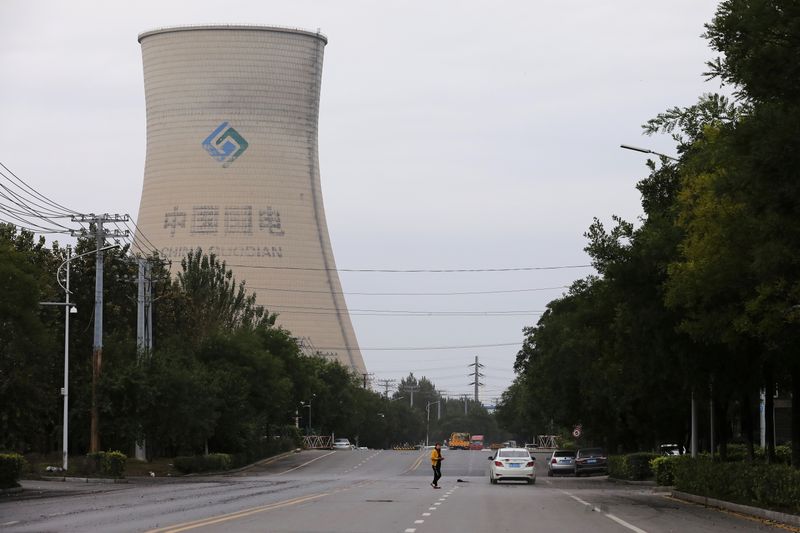By Noah Browning and Bozorgmehr Sharafedin
LONDON (Reuters) - Demand for coal and natural gas has exceeded pre-COVID-19 highs with oil not far behind, dealing a setback to hopes the pandemic would spur a faster transition to clean energy from fossil fuels.
Global natural gas shortages, record gas and coal prices, a power crunch in China and a three-year high on oil prices all tell one story - demand for energy has roared back and the world still needs fossil fuels to meet most of those energy needs.
"The demand fall during the pandemic was entirely linked to governments' decision to restrict movements and had nothing to do with the energy transition," Cuneyt Kazokoglu, head of oil demand analysis at FGE told Reuters.
"The energy transition and decarbonisation are decade-long strategies and do not happen overnight."
Over three-quarters of global energy demand is still met by fossil fuels with less than a fifth by non-nuclear renewables, according to energy watchdog the International Energy Agency.
Energy transition policies have come under fire for the run up in energy prices. In some places, they are having an impact, such as in Europe where high carbon prices aimed at reducing emissions have made utilities reluctant to switch on coal-fired plants to alleviate the shortage.
In China, policies to reduce emissions have contributed to the government's decision to ration energy to heavy industry.
But much of the rise in energy prices is simply because producers took enormous amounts of capacity offline last year when the pandemic led to an unprecedented fall in demand.
Several factors mean temporary shortages may not last.
They could abate with a decision by OPEC to open taps to unleash supply it reined in during the first onslaught of COVID, likely new liquid natural gas (LNG) output coming online after a price slump in the last decade and a Chinese government climb-down on price setting which has undercut coal power production.
RENEWABLES A "SOLUTION, NOT A CAUSE"
Producers of gas, coal, and to a lesser extent oil have been caught flat-footed by the economic recovery, much of it sparked by government stimulus spending in energy-intensive industries.
National policies have also played a role in the power supply problems. In China, state mandated power prices mean utilities simply cannot afford to burn coal and sell the power, because the cost of coal is too high to make a profit.
Chinese utilities are producing below capacity to avoid losing money, not because they cannot produce more.
Meanwhile, most gas projects take several years to design and build, so the shortage now reflects investment decisions taken pre-pandemic - and before the energy transition gathered political momentum.
The chief of the Paris-based IEA said energy transition policies were not to blame for the crisis.
"Well-managed clean energy transitions are a solution to the issues that we are seeing in gas and electricity markets today – not the cause of them," Fatih Birol said in a statement.
2020 LOSSES ERASED
Still, the IEA's data show global demand for coal, the single largest source of CO2 emissions, surpassed pre-pandemic levels late last year.
Global coal supplies are tight because China, responsible for around half of global output, has tightened safety regulations at mines after a spate of accidents, sapping supply.
That has left China importing more coal from Indonesia, in turn leaving less for other importers such as India.
Global coal demand is set for with a 4.5% increase this year, pushing beyond 2019 levels.
(Graphic: IEA coal consumption: https://fingfx.thomsonreuters.com/gfx/mkt/klvykgorxvg/coalconsumptiona.png)
Global natural gas demand fell 1.9% last year, a smaller drop than other energy sources as utilities cranked up power production to meet heating needs during winter.
But the IEA projects gas demand will rise 3.2% in 2021 to over 4 trillion cubic metres, erasing 2020 losses, and pushing demand above 2019 levels.
(Graphic: Rystad LNG demand: https://fingfx.thomsonreuters.com/gfx/mkt/dwpkrdnbgvm/LNGdemand.PNG)
(Graphic: Natural gas McKinsey: https://fingfx.thomsonreuters.com/gfx/mkt/lgpdwkebyvo/mckinze.PNG)
Cold weather patterns in the northern hemisphere, Oslo-based consultancy Rystad Energy said, "caused a rise in demand for coal, liquefied natural gas (LNG), electricity and even a bit of oil (that) is here to stay".
LNG accounts for just over 10% of the global supply but is more readily traded globally so can be deployed more easily to cover short-term supply crunches.
"Eye-popping price spikes and their spread between summer and winter will widen, especially for gas, both natural and liquefied," Rystad added, as prices are higher amid cold winter weather than in summer.
SUPPLY GAPS, SHORT-TERM RALLIES
Last to catch up, oil demand is set to rebound toward pre-pandemic levels above 100 million barrels per day sometime next year, according to four of the major tracking groups.
High prices on oil markets are because OPEC and allied producers still have millions of barrels per day of oil production offline after they made record cuts to supply during the pandemic to match plummeting demand for transport fuel.
Producer club OPEC offers the most robust prediction for a demand rebound, putting the recovery date at the second quarter of 2022.
(Graphic: World Oil Demand Recovery Timeline from Pandemic: https://fingfx.thomsonreuters.com/gfx/mkt/zdvxoddrwpx/Pasted%20image%201631622128583.png)
(Graphic: FGE Oil Demand: https://fingfx.thomsonreuters.com/gfx/mkt/mopankzrqva/FGEoildemand.PNG)
In the more distant future, with most forecasters predicting a peak in fossil fuel demand within the next two decades and the IEA recommending against new projects to ensure net zero emissions, broader supply gaps could fuel more price shocks.
(Graphic: McKinsey fossil fuel peak: https://fingfx.thomsonreuters.com/gfx/mkt/znvnebogjpl/fossilsmckinsey.PNG)

"Prices for fossil fuels will remain volatile", said Nikos Tsafos, senior fellow at the Center for Strategic and International Studies (CSIS).
"The risk of a supply-demand imbalance is greater in a market that is shrinking where the case for further investment is weak, which could produce short-term rallies."